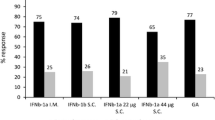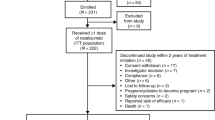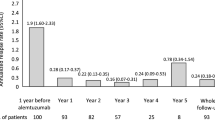Abstract
Background and objectives
Different treatment response scoring systems in treated MS patients exist. The objective was to assess the long-term predictive value of these systems in RRMS patients treated with self-injectable DMTs.
Methods
RRMS-treated patients underwent brain MRI before the onset of therapy and 12 months thereafter, and neurological assessments every 6 months. Clinical and demographic characteristics were collected at baseline. After the first year of treatment, several scoring systems [Rio score (RS), modified Rio score (MRS), MAGNIMS score (MS), and ROAD score (RoS)] were calculated. Cox-Regression and survival analyses were performed to identify scores predicting long-term disability.
Results
We included 319 RRMS patients. Survival analyses showed that patients with RS > 1 and RoS > 3 had a significant risk of reaching an EDSS of 4.0 and 6.0 The score with the best sensitivity (61%) was the RoS, while the MRS showed the best specificity (88%). The RS showed the best positive predictive value (42%) and the best accuracy (81%).
Conclusions
The combined measures integrated into different scores have an acceptable prognostic value for identifying patients with long-term disability.
Thus, these data reinforce the concept of early treatment optimization to minimize the risk of long-term disability.



Similar content being viewed by others
Change history
20 November 2021
A Correction to this paper has been published: https://doi.org/10.1007/s00415-021-10906-x
References
Rotstein D, Montalban X (2019) Reaching an evidence-based prognosis for personalized treatment of multiple sclerosis. Nat Rev Neurol 15(5):287–300
Gasperini C, Prosperini L, Tintoré M et al (2019) Unraveling treatment response in multiple sclerosis: a clinical and MRI challenge. Neurology 92:180–192
Sormani MP, De Stefano N (2013) Defining and scoring response to IFN-β in multiple sclerosis. Nat Rev Neurol 9:504–512
Río J, Castilló J, Rovira A et al (2009) Measures in the first year of therapy predict the response to interferon beta in MS. Mult Scler 15(7):848–853
Sormani M, Signori A, Stromillo M, De Stefano N (2013) Refining response to treatment as defined by the Modified Rio Score. Mult Scler 19(9):1246–1247
Sormani MP, Gasperini C, Romeo M et al (2016) Assessing response to interferon-β in a multicenter dataset of patients with MS. Neurology 87(2):134–140
Gasperini C, Prosperini L, Rovira A et al (2021) Scoring the 10 year risk of ambulatory disability in DMD-treated multiple sclerosis patients: the RoAD score. Eur J Neurol 28(8):2533–2542
Bermel RA, You X, Foulds P et al (2013) Predictors of long-term outcome in multiple sclerosis patients treated with interferon beta. Ann Neurol 73:95–103
Río J, Rovira A, Tintoré M et al (2018) Disability progression markers over 6–12 years in interferon-β-treated multiple sclerosis patients. Mult Scler 24:322–330
Bergamaschi R, Berzuini C, Romani A, Cosi V (2001) Predicting secondary progression in relapsing–remitting multiple sclerosis: a Bayesian analysis. J Neurol Sci 189(1–2):13–21
Bergamaschi R, Quaglini S, Trojano M et al (2007) Early prediction of the long-term evolution of multiple sclerosis: the Bayesian Risk Estimate for Multiple Sclerosis (BREMS) score. J Neurol Neurosurg Psychiatry 78(7):757–759
Bergamaschi R, Montomoli C, Mallucci G et al (2015) BREMSO: a simple score to predict early the natural course of multiple sclerosis. Eur J Neurol 22(6):981–989
Kurtzke JF (1983) Rating neurologic impairment in multiple sclerosis: an expanded disability status scale (EDSS). Neurology 33:1444–1452
Wattjes MP, Rovira À, Miller D et al (2015) Evidence-based guidelines: MAGNIMS consensus guidelines on the use of MRI in multiple sclerosis–establishing disease prognosis and monitoring patients. Nat Rev Neurol 11(10):597–606
Brown JWL, Coles A, Horakova D et al (2019) Association of initial disease-modifying therapy with later conversion to secondary progressive multiple sclerosis. JAMA 321(2):175–187
Harding K, Williams O, Willis M et al (2019) Clinical outcomes of escalation vs early intensive disease-modifying therapy in patients with multiple sclerosis. JAMA Neurol 76(5):536–541
Río J, Ruiz-Peña JL (2016) Short-term suboptimal response criteria for predicting long-term non-response to first-line disease modifying therapies in multiple sclerosis: a systematic review and meta-analysis. J Neurol Sci 361:158–167
Río J, Comabella M, Montalban X (2009) Predicting responders to therapies for multiple sclerosis. Nat Rev Neurol 5(10):553–560
Prosperini L, Gallo V, Petsas N, Borriello G, Pozzilli C (2009) One year MRI scan predicts clinical response to interferon beta in multiple sclerosis. Eur J Neurol 16(11):1202–1209
Prosperini L, Mancinelli C, Haggiag S et al (2020) Minimal evidence of disease activity (MEDA) in relapsing–remitting multiple sclerosis. J Neurol Neurosurg Psychiatry 91:271–277
Rae-Grant A, Day GS, Marrie RA et al (2018) Practice guideline recommendations summary: disease-modifying therapies for adults with multiple sclerosis neurology. Neurology 90:777–788
Rush CA, MacLean HJ, Freedman MS (2015) Aggressive multiple sclerosis: proposed definition and treatment algorithm. Nat Rev Neurol 11(7):379–389
Romeo M, Martinelli V, Rodegher M et al (2015) Validation of 1-year predictive score of long-term response to interferon-β in everyday clinical practice multiple sclerosis patients. Eur J Neurol 22:973–980
Rio J, Nos C, Tintoré M et al (2006) Defining the response to interferon-beta in relapsing–remitting multiple sclerosis patients. Ann Neurol 59:344–352
Filippi M, Rocca MA (2010) Multiple sclerosis: monitoring long-term treatments in multiple sclerosis. Nat Rev Neurol 6:421–422
Alenda R, Costa-Frossard L, Alvarez-Lafuente R et al (2018) Blood lymphocyte subsets identify optimal responders to IFN-beta in MS. J Neurol 265:24–31
Tintoré M, Rovira A, Río J et al (2008) Do oligoclonal bands add information to MRI in first attacks of multiple sclerosis? Neurology 70(13 Pt 2):1079–1083
Galassi S, Prosperini L, Logoteta A et al (2016) A lesion topography-based approach to predict the outcomes of patients with multiple sclerosis treated with Interferon Beta. Mult Scler Relat Disord 8:99–106
Iaffaldano P, Lucisano G, Butzkueven H et al (2021) Early treatment delays long-term disability accrual in RRMS: results from the BMSD network. Mult Scler. https://doi.org/10.1177/132458211010/28
Kalincik T, Diouf I, Sharmin S et al (2021) Effect of disease-modifying therapy on disability in relapsing–remitting multiple sclerosis over 15 years. Neurology 96:e783–e797
He A, Merkel B, Brown JWL et al (2020) Timing of high-efficacy therapy for multiple sclerosis: a retrospective observational cohort study. Lancet Neurol 19:307–316
Buron MD, Chalmer TA, Sellebjerg F et al (2020) Initial high-efficacy disease-modifying therapy in multiple sclerosis: a nationwide cohort study. Neurology 95:e1041–e1051
Iaffaldano P, Lucisano G, Caputo F et al (2021) Long-term disability trajectories in relapsing multiple sclerosis patients treated with early intensive or escalation treatment strategies. Ther Adv Neurol Disord 14:1–10
Author information
Authors and Affiliations
Corresponding author
Ethics declarations
Conflicts of interest
J Río has received speaking honoraria and personal compensation for participating on Advisory Boards from Almirall, Bayer-Schering Healthcare, Biogen-Idec, Genzyme, Merck- Serono, Novartis, Teva, and Sanofi-Aventis. A Rovira serves on scientific advisory boards for Novartis, Sanofi-Genzyme, SyntheticMR, Biogen and OLEA Medical, and has received speaker honoraria from Bayer, Sanofi-Genzyme, Merck-Serono, Teva Pharmaceutical Industries Ltd, Novartis, Roche and Biogen. C Gasperini has received fee as speaker or advisory board by Merck, Bayer, Biogen, Novartis, Teva, Genzyme. M Tintore has received compensation for consulting services and speaking honoraria from Almirall, Bayer Schering Pharma, Biogen-Idec, Genzyme, Merck-Serono, Novartis, Roche, Sanofi-Aventis, Viela Bio and Teva Pharmaceuticals. MT is co-editor of Multiple Sclerosis Journal- ETC. L Prosperini has received fee as speaker or advisory board by Merck, Bayer, Biogen, Novartis, Teva, Genzyme. S Otero-Romero has received speaking and consulting honoraria from Genzyme, Biogen-Idec, Novartis, Roche, Excemed and Merk; and research support from Novartis. M Comabella has received compensation for consulting services and speaking honoraria from Bayer Schering Pharma, Merk Serono, Biogen-Idec, Teva Pharmaceuticals, Sanofi-Aventis, and Novartis. C Nos has received compensation as steering committee member of clinical trials from Hoffmann-La Roche, and funding for registration in scientific meetings from Novartis. A Vidal-Jordana receives support for contracts Juan Rodes (JR16/00024) from Fondo de Investigaciones Sanitarias, Instituto de Salud Carlos III, Spain; and has received speaking honoraria and travel expenses from Novartis, Roche, Teva, Biogen and Sanofi-Genzyme. C Tur is currently being funded by a Junior Leader La Caixa Fellowship. The project that gave rise to these results received the support of a fellowship from “la Caixa” Foundation (ID 100010434). The fellowship code is LCF/BQ/PI20/11760008. She has also received the 2021 Merck’s Award for the Investigation in Multiple Sclerosis (Ayudas para la Investigación en Esclerosis Múltiple, 2021), awarded by the Merck Foundation. In 2015, she received an ECTRIMS Post-doctoral Research Fellowship and has received funding from the UK MS Society. She has also received honoraria and support for traveling from Merck Serono, Sanofi, Roche, TEVA Pharmaceuticals, Novartis, Biogen, Bayer and Ismar Healthcare. G. Arrambide has received compensation for consulting services or participation in advisory boards from Sanofi and Merck; research support from Novartis; travel expenses for scientific meetings from Novartis, Roche, and ECTRIMS; and speaking honoraria from Stendhal, Sanofi, Merck. G. Arrambide is a member of the executive committee of the International Women in Multiple Sclerosis (iWiMS) network. A. Cobo-Calvo has received grant from Instituto de Salud Carlos III, Spain; JR19/00007. Breogán Rodríguez-Acevedo has received honoraria for consulting services from Wellspect. C Auger has received speaking honoraria from Novartis, Biogen and Stendhal. J Sastre-Garriga has received compensation for participating on Advisory Boards, speaking honoraria and travel expenses for scientific meetings, consulting services or research support from Celgene, Novartis, Biogen, Teva, Merck, Almirall, and Genzyme. X Montalban has received speaking honoraria and travel expenses for participation inscientific meetings, has been a steering committee member of clinical trials or participated in advisory boards of clinical trials in the past with Actelion, Amirall, Bayer, Biogen, Celgene, Genzyme, Hoffmann-La Roche, Novartis, Oryzon Genomics, Sanofi-Genzyme, and Teva Pharmaceutical. L Midaglia, I Galán, J Castilló, and A Zabalza report no disclosures.
Ethical standard statement
The local ethical committee approved the study, and all patients provided their informed consent.
Rights and permissions
About this article
Cite this article
Río, J., Rovira, À., Gasperini, C. et al. Treatment response scoring systems to assess long-term prognosis in self-injectable DMTs relapsing–remitting multiple sclerosis patients. J Neurol 269, 452–459 (2022). https://doi.org/10.1007/s00415-021-10823-z
Received:
Revised:
Accepted:
Published:
Issue Date:
DOI: https://doi.org/10.1007/s00415-021-10823-z




